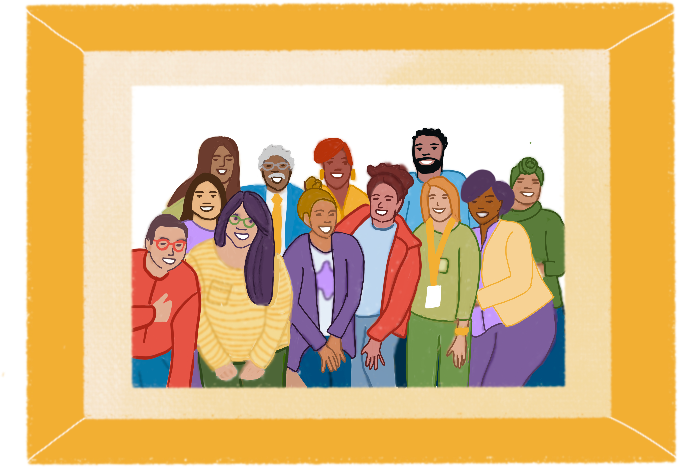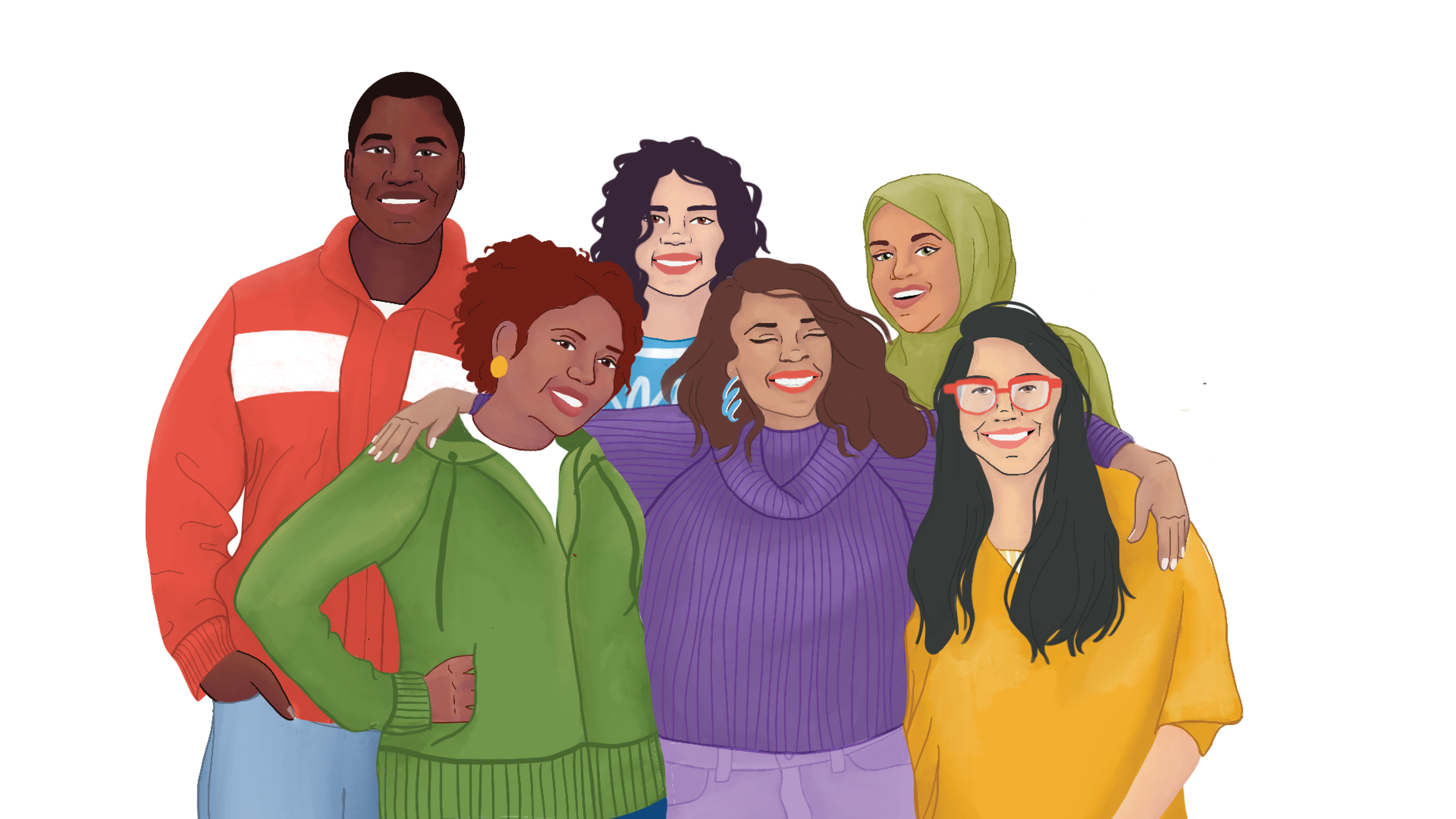
Story by Julie Yu | Illustrations by Carla Fabian | Icons by Terresa Moses

It is inconceivable for Dr. Bill Allen to separate his role as a teacher from his responsibility to be a student.
In his home a quote from Peter Drucker, the influential management theorist, is prominently framed: “Learning is a lifelong process.” It is a fitting tribute to Allen’s earlier career in business and the perspective he now brings to mentorship. These days, as a teacher and a Pathways mentor, he doesn’t set concrete goals for his students to meet, instead choosing to lift up their own power to define their path. Because reinforcing their voices and decisions matters more than the expectations and norms of an industry.
When asked about the guiding force behind his perspective, Allen points to personal experiences as a student and as a clinician of color with more than 20 years in the mental health field.

“I was lucky that when I was young, I had people tell me that I get to decide how I contribute,”
Allen shares. “I get to shape my path. Not the person who hires me, not the organization, not even the therapeutic field. I get to make choices, and I get to make those choices based on my own experiences, my own skills and methods, my understanding of myself. I emphasize that to those who I mentor now.”
A longtime family therapist, author, researcher and professor, Allen first joined Washburn Center 20 years ago, as part of a team whose goal was to increase the diversity of staff and to better reflect the needs of a rapidly diversifying client base. After leaving to open his own practice, Allen remained a clinical consultant. Leveraging his wisdom and leaning on his experience, Allen gave direct input when Washburn Center began to coalesce many years of conversation into the project that would become the Pathways program.
At the invitation of Washburn Center CEO Tom Steinmetz, Allen joined a roster of community leaders, students of color, and other local stakeholders who were focused on addressing the many barriers that students of color face when completing their degree.

“I pushed for mentorship as a foundational component of whatever we ended up putting together,” Allen recalls, thinking back to those early discussions. “I felt that mentoring was essential to any system of support, particularly for healers new to the field.”

At first glance, Allen’s own path to therapeutic practice is a surprising one. After completing a bachelor’s degree in child psychology at Brown University, he left the East Coast for Minnesota, where he began working in sales and marketing in the computer industry, a job that would stretch into a 15-year corporate career. As the years passed, however, he found himself persistently struck by the detachment and depersonalization that he observed in the business setting.
“I was in the business industry for 15 years, and what I learned there is that you’ve got a ton of people doing things they’re not good at,”
Allen laughs ruefully. “And not only that, things they don’t even like to do, that they don’t get any enjoyment from, just because they feel like they have to do it.”
It became increasingly clear that his time there was transitory. While in the workforce, however, he had begun to see a greater focus on culture, diversity, and their effects on behavior and thought processes in the service sector. He also learned more about the experiences that families of color were having in the mental health system, and began exploring ways he could make a difference. To truly pursue his interest in human services, he realized he would have to return to school.
After completing his doctorate in family social sciences in 1997, Allen joined a private practice with two other colleagues. Three years later, he started his own practice, Healing Bonds, serving individuals, couples and families, many referred by social service agencies, counties or the child welfare system. Drawing on his foundation in child psychology, his masters research in African-American adolescent fatherhood, and his doctoral research on African-American marriages, Allen is often called to work with adolescents and families with whom other practitioners have struggled.
In his practice, his office, and his classroom, Allen shares his trajectory as an example of the idea that learning is a lifelong journey, an iterative and constantly changing process. It has drawn him to create a kaleidoscopic approach to mentorship. There is no one goal, one best practice or one perfect curriculum. Rather than encouraging students and mentees to focus on a single path forward, he provides them with the tools to see and create a myriad of possibilities.
“As a teacher and mentor, my job isn’t to pour learning into your brain, the same way a good coach doesn’t get on the field and try to play for you,” he shares about his approach to mentorship. “Instead, I try to help mentees learn how to learn.”

Through the lens of his own experiences as a practitioner, as well as many years as a professor and consultant, Allen helps Pathways fellows navigate the complex constellation of psychological, social and cultural factors that shape therapeutic experiences.
“In the mental health field, the people in charge often say that culture doesn’t make a difference: that the right techniques can make up for any cultural divides,” he observes. “That’s ridiculous. It does matter, and it should matter.”

This is one of the most important roles that the Pathways program can play. For many junior clinicians of color, there are few places in the mental health field to find acknowledgment, validation and support for their perspectives and experiences. And this dearth of resources for clinicians has a direct impact on access to care for clients of color.
“There’s a term we use in the field: cultural competence. There are many interpretations of that,” Allen explains. “But what I mean when I say it is an understanding that culture is multifaceted, and the better you have a match between the cultures that a client is embedded in and the cultures a therapist is embedded in, the more effective that work can be.”
As one of the founding forces behind Pathways, Allen defines the program as a structure to provide mentorship for clinicians of color in the Washburn Center who are young in experience, and to give guidance as junior clinicians deal with the challenges that face people of color entering the mental health field. Most importantly, Allen notes, the Pathways program lifts up support that is rooted in empowerment and validation, rather than leaning into harmful stereotypes about marginalized identities.
“The point of mentorship—and the point of Pathways—is not for these clinicians of color to think, ‘I’m not going to make it because I’m always going to be disadvantaged,’” he stresses. “Instead, it’s to affirm that not only are they going to make it, they will shape it. They’re going to lead it.”
He’s certain that someday, these Pathways fellows will become mentors themselves.

“I try to emphasize for fellows that at some point, they will be in that position,” he adds. “They could be thinking, even now, about how they’ll choose to mentor, how they’ll give back to the communities that they’re embedded in.”
It’s this cycle of community and hope that inspires Allen to continue his work as a mentor. He cherishes stories from clinicians who have graduated from the program, and remembers details from every journey.
“The best moments are when a fellow comes back a year, a couple years later with an update about what they’re doing, where they’ve gone, what they’re learning,” he says, bringing both hands to his heart. “It just feels like a moment of ‘Oh! I’ve done something good. Something important.’”
As a clinician of color in the mental health field, Allen hopes that Pathways fellows graduate from the program with the resources to create ongoing personal systems of support that celebrate and cultivate—rather than dissuade—cultural dimension. As a voice of experience, he hopes to walk alongside them in affirmation of their voice, their story, their visibility. And as a mentor, his greatest hope is that he has bolstered fellows’ trust in their own courage.
“I think people in the healing field can underestimate how much courage it takes to be a good healer. It’s a courage that society doesn’t always value or appreciate,” Allen says candidly. “The courage to be in a space with someone who is healing, who is in trauma, who needs support. But healers have that courage. And when they recognize and nourish it, it will be their companion in everything they pursue.”

Story created in partnership with Pollen Studio and Washburn Center for Children & the Pathways program.

Contributors





